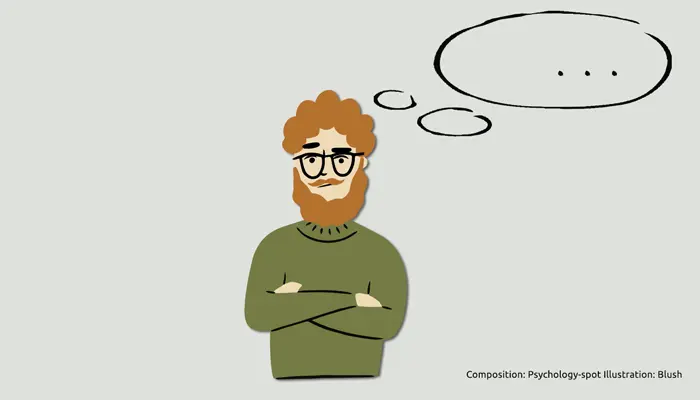
Anticipatory thinking can become our best ally or our worst enemy. The ability to project ourselves into the future and imagine what could happen allows us to prepare ourselves to face problems in the best possible way, but it can also become an obstacle that sinks us into pessimism and paralyzes us. Understanding how anticipatory thinking works and what traps it can set us will help us use this wonderful ability to our advantage.
What is anticipatory thinking?
Anticipatory thinking is a cognitive process by which we recognize challenges and problems that may arise and prepare to face them. It is a mental mechanism that allows us to formulate possible alternatives with a view to the future and make sense of them before they occur.
Obviously, anticipatory thinking is a complex process involving different aspects of our cognition. Not only does it demand that we be vigilant to monitor certain events and that we be able to ignore others that are not relevant, but it also requires us to apply our knowledge and experiences from the past to predict what could happen, while we search for possible solutions and deal with uncertainty and the ambiguity that entails the future.
In fact, anticipatory thinking is a problem detection and resolution strategy. It is not simply about accumulating discrepancies until reaching a potentially dangerous threshold, but requires that we rethink how we see the situation. That means changing mental patterns and frames. Therefore, anticipatory thinking is a form of mental simulation and a mechanism for generating expectations about what could happen.
The 3 types of anticipatory thinking we use to predict the future
1. Pattern matching
The experiences that we live throughout life allow us to detect the existence of certain patterns. For example, we note that when there are black clouds in the sky, it is likely to rain. Or that when our partner is in a bad mood, we are likely to end up arguing. Anticipatory thinking uses these patterns as a “database.”
In practice, it constantly compares the events of the present with those that occurred in the past to detect signs that may indicate a difficulty on the horizon or that we are experiencing something abnormal. Anticipatory thinking provides us with an early warning system when we are about to have a problem. It tells us that something is wrong, based on our past experiences.
Obviously, it is not a foolproof system. Relying too much on our experiences can lead us to make wrong predictions since the world is constantly evolving and any small changes that we have not detected can lead to different results. So while this kind of anticipatory thinking is important, we must use it with some reserve.
2. Track the trajectory
This kind of anticipatory thinking compares what is happening with our predictions. We do not forget about our past experiences, but we pay more attention to the present. To predict if a couple’s argument will take place, for example, if we use our patterns we will limit ourselves to assessing the level of anger and bad mood, but if we take the trajectory into account, we will monitor the mood of the other person in real time.
With this strategy we do not limit ourselves to noticing and extrapolating patterns or trends, but we apply a functional perspective. Obviously, the mental process that is put in place to follow a trajectory and make comparisons is more complex than directly associating a signal with a threatening outcome, thus requiring greater emotional energy.
The main weakness of this type of anticipatory thinking is that we can spend too much time assessing the trajectory of events, so if they crumble, they could take us by surprise, without being fully prepared to face them. We run the risk of staying too long as mere spectators and running out of time to react and without an effective plan of action.
3. Convergence
This kind of anticipatory thinking is the most complex, because it requires us to notice the connections between events. Rather than simply responding to old patterns or following a trajectory of current events, we appreciate the implications of different events and understand their interdependence.
This strategy is usually a mixture of conscious thinking and unconscious cues. In fact, it often demands to put into practice mindfulness, that allows us to perceive all the details from a detached perspective that helps us to form a global image of what is happening.
In many cases, convergence occurs unintentionally. We are noticing the signals and inconsistencies, while our thinking gives them meaning and integrates them into a more global picture that allows us to appreciate the connections and to be able to follow their trail to make more accurate predictions.
The benefits of anticipatory thinking
Anticipatory thinking is considered a sign of experience and intelligence in many fields. Chess grandmasters, for example, analyze mentally the possible moves of their opponents before moving a piece. By getting ahead of their opponent’s moves, they gain the upper hand in the game and increase their chances of winning the game.
In life, anticipatory thinking can work to our advantage. We can scan the horizon trying to predict where certain decisions will take us. So we could determine with some certainty which decisions could be positive and which could get us into trouble. Anticipatory thinking is therefore essential to plan and prepare to travel the path we have chosen.
Not only does it help us to anticipate possible difficulties and obstacles, but it also allows us to draw up an action plan to overcome those problems, or at least minimize their impact. Therefore, it can help us avoid suffering and save energy along the way.
The dark side of anticipating problems
“A man was doing some repairs at his house when he realized that he needed a power drill, but he didn’t have one and all the stores were closed. He then remembered that his neighbor had one. He would ask him to borrow it. But before reaching the door he was struck by a question: ‘What if he doesn’t want to lend it to me?’
He then he remembered that the last time they saw each other. His neighbor was not as friendly as usual. Maybe he was in a hurry, or maybe he was upset with him.
‘Obviously, if he’s upset with me, he won’t lend me the drill. He will make up any excuse and I will be ridiculous. Will you think that you are more important than me just because you have something I need? It’s the height of arrogance! ‘ Thought the man. Angry, he resigned himself to not being able to finish the repairs at home because his neighbor would never lend him the drill. When he saw him again, he would not speak to him.”
This story is a good example of the problems that anticipatory thinking can cause us when it takes the wrong paths. This type of reasoning can become an everyday thinking pattern that only serves to see problems and obstacles where there are none, or where they are quite unlikely to occur.
When anticipatory thinking becomes a mere detector of difficulties, it leads to pessimism because we take away its most useful part: the possibility of projecting strategies for the future.
Then we can fall into the clutches of anxiety. We began to fear what could happen. Anxiety and distress related to anticipation can create blind spots and build mountains out of a grain of sand. Thus we run the risk of becoming prisoners of anticipatory thinking.
At other times we can fall directly into a depressive state in which we assume that we can do nothing. We convince ourselves that the problems looming on the horizon are unsolvable and we get stuck, feeding a passive posture in which we see ourselves as victims of a destiny that we cannot change.
How to use anticipatory thinking to make life easier – instead of complicating it?
Anticipatory thinking is helpful because it enables us to prepare to respond in the most adaptive way possible. Therefore, we must ensure that when this type of thinking is launched, it is not limited to detecting dangers, problems and obstacles along the way, but we must ask ourselves what we can do to avoid those risks or at least reduce their impact.
Those who better use anticipatory thinking are those who do not just predict problems, but look for meaning. They are not just noticing the red flags in the middle, but are interpreting them in terms of what they could do to deal with them. Their mind is focused on what they can do and anticipatory thinking takes on functional insight.
Therefore, the next time you see problems on the horizon, do not just regret or worry, ask yourself what you can do and make a plan of action. So you can get the most out of that extraordinary tool that is anticipatory thinking.
Sources:
Hough, A. et. Al. (2019) A Metacognitive Triggering Mechanism for Anticipatory Thinking. In: ResearchGate.
McKierman, P. (2017) Prospective thinking; scenario planning meets neuroscience. Technological Forecasting and Social Change; 124: 66-76.
Mullally, S. L. & Maguire, E. A. (2014) Memory, Imagination, and Predicting the Future: A Common Brain Mechanism? Neuroscientist; 20(3): 220-234.
Klein, G. & Snowden, D. J. (2011) Anticipatory Thinking. In: ResearchGate.
Byrne, C. L. et. Al. (2010) The Effects of Forecasting on Creative Problem-Solving: An Experimental Study. Creativity Research Journal; 22(2): 119-138.



